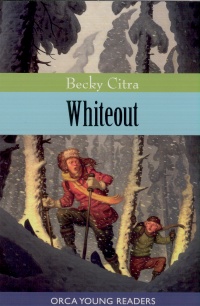| ________________
CM . . .
. Volume XVI Number 7. . . .October 16, 2009
excerpt:
Robin and her family live on a remote ranch in the interior of British Columbia, an hour's drive from the tiny community of 100 Mile House, but even that is only accessible if the weather cooperates. Robin is happy enough, but she is bugged by her extrovert younger sister. The novel opens as Robin is anxiously awaiting the arrival of her cousin, April and her Aunt Jen who are expected to come to the ranch for Christmas. Robin feels very connected to April and regards her as her personal property and is very jealous of her younger sister's attempts to attract attention. When April and her mother are seriously injured in a car accident on the way to the ranch, April is more concerned with her feelings of guilt for begging them to come, even in bad weather, than she is about the consequences of the accident. When April comes to the ranch to live while her mother recuperates from serious injuries, she seems different to Robin. Her long hair has been cut, she has a new best friend in Vancouver, and she seems distant and disconnected. Robin feels shut out, and her younger sister seems even buggier than usual. The strength of Whiteout lies in the depiction of Robin as a typical pre-teen, too self-absorbed and too immature to understand or comprehend the real pain and dislocation being suffered by her cousin April. She feels shut out by April but is not capable of reaching out to share her pain, or to offer any understanding or empathy. She is more concerned about balancing her social concerns with the responsibility of being kind to the cousin she does not understand any more. It is only when Robin and April unite to rescue Molly, who has dashed out into a snowstorm alone, that Robin finally asks questions about her aunt's injuries, and April feels able to respond with the sad truth about her mother.
Recommended. Wendy Williams is a teacher-librarian in Calgary, AB.
To comment
on this title or this review, send mail to cm@umanitoba.ca.
Copyright © the Manitoba Library Association. Reproduction for personal
use is permitted only if this copyright notice is maintained. Any
other reproduction is prohibited without permission.
NEXT REVIEW |
TABLE OF CONTENTS FOR THIS ISSUE
- October 16, 2009.
AUTHORS |
TITLES |
MEDIA REVIEWS |
PROFILES |
BACK ISSUES |
SEARCH |
CMARCHIVE |
HOME |
